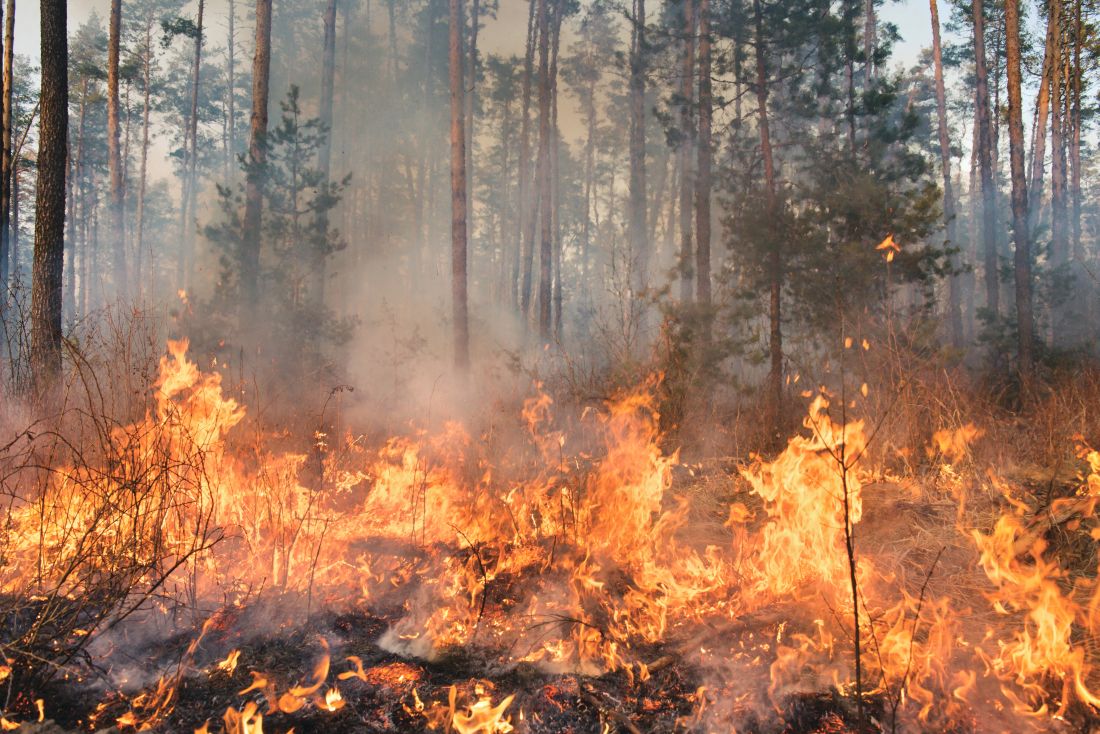User login
When I grow up, I want to be a fireman. Not long ago, I had occasion to revisit why firefighters are such heroes to young and old. In the process, I learned quite a bit about how fires are managed and realized that a really good surgeon has much in common with a fire Incident Commander.
In late June 2018, a man started a fire in Southern Colorado. That small campfire became the Spring Fire, the third-largest forest fire in Colorado history, which is saying a lot. By the time the fire was mostly contained 2 weeks later, 175 square miles of land had been burned and 1,800 firefighters were involved in the disaster. More than 150 homes were destroyed. Not one person died in or as a result of this fire. Only the most grudging of critics would deny that, while the fire itself was a disaster, the response and outcome constituted a good definition of success.
This story was more than just 30 seconds on the nightly news to me because I was one of the people whose property and 32 years of precious family memories were in danger. I clung to any news of the fire. My own daughter had to evacuate our place there when smoke and flame were visible just a few miles away. I was helpless to do anything but hoped that somehow this conflagration could be stopped.
Within 48 hours, Rocky Mountain Black Team – headed by a man named Shane Greer – arrived in the area. Mr. Greer is the Incident Commander of the Black Team. Over the next 10 days he was the personification of the response to the Spring Fire. He was the main person carrying the overall responsibility for controlling the fire.
The fire is over now, but I reflect frequently on the parallels between surgery and firefighting. I identified with Mr. Greer as probably many did. He didn’t actually stop the fire, but he led the people who did. I was intrigued by this role and I did a little research in fire Incident Commanders. Here’s a list of their numerous roles and responsibilities that I gleaned from an article on the website Firehouse by editor Dennis Rubin from several years ago:
- The Incident Commander (IC) must be a qualified, single, central, and well-supported individual.
- The IC’s main concern is safety of lives and must be conversant in fire-safety procedures.
- The IC must have an understanding of his/her personal limitations. An IC must have firsthand experience at firefighting so that the IC is an individual well informed of the difficulties being experienced on the front line of the fire.
- The priorities of the IC are a) life safety; b) incident stabilization; and c) property conservation.
- The IC develops strategies (what to do) and tactics (how to do it) and follows action plans to achieve these goals.
- The IC develops a management structure that uses span of control (one supervisor per five subordinates) with each unit having a single boss.
- A good IC is a good delegator and calls for help early in the incident including placement of resources in staging areas.
- The IC is responsible for all communication among the team and to the media/public.
- The IC coordinates with outside agencies.
Does this sound familiar to you? Substitute surgeon for IC and you have today’s profile of a good surgeon. When executed well, everyone involved in an incident gets to be a hero and feels a part of something bigger than themselves. The IC (surgeon) gets a lot of credit, but that person also makes sure the whole team gets all the credit and thanks they deserve.
What I see happening in some situations is that we in medicine are putting the wrong ICs in charge or abdicating our positions as IC to others because being an IC is a hard, demanding, full-time job. I also see medicine violating the principles in the first bullet point above – a single, central, and well-supported individual. We get the job of IC and then payers, administrators, and outside agencies drop the support part of the ball. We also have a tendency to violate the “qualified” part of the job description. Someone who has put on the gown and gloves and borne the responsibility of operating should be the quarterback and not someone who has only observed that process.
I can’t thank enough the Black Team and all those who fought the Spring Fire. I hope we all aspire to be ICs in our surgical world. There is a great nobility in such professions as firefighting and surgery, where we jump in to help others who can’t help themselves. The Black Team showed that to me and my community in Colorado. It makes one proud of what we human beings can do when we decide to work together.
True leadership and teamwork do not fragment but instead pull resources together. Patients need that. They need to know that a qualified, single, central, and well-supported person is directing their incident. The existence of such a person fulfilling that role is key to keep the trust that the public places in us. May all our “fires” be led by a good surgeon, er, Incident Commander surgeon.
Dr. Hughes is clinical professor in the department of surgery and director of medical education at the Kansas University School of Medicine, Salina Campus, and Co-Editor of ACS Surgery News.
When I grow up, I want to be a fireman. Not long ago, I had occasion to revisit why firefighters are such heroes to young and old. In the process, I learned quite a bit about how fires are managed and realized that a really good surgeon has much in common with a fire Incident Commander.
In late June 2018, a man started a fire in Southern Colorado. That small campfire became the Spring Fire, the third-largest forest fire in Colorado history, which is saying a lot. By the time the fire was mostly contained 2 weeks later, 175 square miles of land had been burned and 1,800 firefighters were involved in the disaster. More than 150 homes were destroyed. Not one person died in or as a result of this fire. Only the most grudging of critics would deny that, while the fire itself was a disaster, the response and outcome constituted a good definition of success.
This story was more than just 30 seconds on the nightly news to me because I was one of the people whose property and 32 years of precious family memories were in danger. I clung to any news of the fire. My own daughter had to evacuate our place there when smoke and flame were visible just a few miles away. I was helpless to do anything but hoped that somehow this conflagration could be stopped.
Within 48 hours, Rocky Mountain Black Team – headed by a man named Shane Greer – arrived in the area. Mr. Greer is the Incident Commander of the Black Team. Over the next 10 days he was the personification of the response to the Spring Fire. He was the main person carrying the overall responsibility for controlling the fire.
The fire is over now, but I reflect frequently on the parallels between surgery and firefighting. I identified with Mr. Greer as probably many did. He didn’t actually stop the fire, but he led the people who did. I was intrigued by this role and I did a little research in fire Incident Commanders. Here’s a list of their numerous roles and responsibilities that I gleaned from an article on the website Firehouse by editor Dennis Rubin from several years ago:
- The Incident Commander (IC) must be a qualified, single, central, and well-supported individual.
- The IC’s main concern is safety of lives and must be conversant in fire-safety procedures.
- The IC must have an understanding of his/her personal limitations. An IC must have firsthand experience at firefighting so that the IC is an individual well informed of the difficulties being experienced on the front line of the fire.
- The priorities of the IC are a) life safety; b) incident stabilization; and c) property conservation.
- The IC develops strategies (what to do) and tactics (how to do it) and follows action plans to achieve these goals.
- The IC develops a management structure that uses span of control (one supervisor per five subordinates) with each unit having a single boss.
- A good IC is a good delegator and calls for help early in the incident including placement of resources in staging areas.
- The IC is responsible for all communication among the team and to the media/public.
- The IC coordinates with outside agencies.
Does this sound familiar to you? Substitute surgeon for IC and you have today’s profile of a good surgeon. When executed well, everyone involved in an incident gets to be a hero and feels a part of something bigger than themselves. The IC (surgeon) gets a lot of credit, but that person also makes sure the whole team gets all the credit and thanks they deserve.
What I see happening in some situations is that we in medicine are putting the wrong ICs in charge or abdicating our positions as IC to others because being an IC is a hard, demanding, full-time job. I also see medicine violating the principles in the first bullet point above – a single, central, and well-supported individual. We get the job of IC and then payers, administrators, and outside agencies drop the support part of the ball. We also have a tendency to violate the “qualified” part of the job description. Someone who has put on the gown and gloves and borne the responsibility of operating should be the quarterback and not someone who has only observed that process.
I can’t thank enough the Black Team and all those who fought the Spring Fire. I hope we all aspire to be ICs in our surgical world. There is a great nobility in such professions as firefighting and surgery, where we jump in to help others who can’t help themselves. The Black Team showed that to me and my community in Colorado. It makes one proud of what we human beings can do when we decide to work together.
True leadership and teamwork do not fragment but instead pull resources together. Patients need that. They need to know that a qualified, single, central, and well-supported person is directing their incident. The existence of such a person fulfilling that role is key to keep the trust that the public places in us. May all our “fires” be led by a good surgeon, er, Incident Commander surgeon.
Dr. Hughes is clinical professor in the department of surgery and director of medical education at the Kansas University School of Medicine, Salina Campus, and Co-Editor of ACS Surgery News.
When I grow up, I want to be a fireman. Not long ago, I had occasion to revisit why firefighters are such heroes to young and old. In the process, I learned quite a bit about how fires are managed and realized that a really good surgeon has much in common with a fire Incident Commander.
In late June 2018, a man started a fire in Southern Colorado. That small campfire became the Spring Fire, the third-largest forest fire in Colorado history, which is saying a lot. By the time the fire was mostly contained 2 weeks later, 175 square miles of land had been burned and 1,800 firefighters were involved in the disaster. More than 150 homes were destroyed. Not one person died in or as a result of this fire. Only the most grudging of critics would deny that, while the fire itself was a disaster, the response and outcome constituted a good definition of success.
This story was more than just 30 seconds on the nightly news to me because I was one of the people whose property and 32 years of precious family memories were in danger. I clung to any news of the fire. My own daughter had to evacuate our place there when smoke and flame were visible just a few miles away. I was helpless to do anything but hoped that somehow this conflagration could be stopped.
Within 48 hours, Rocky Mountain Black Team – headed by a man named Shane Greer – arrived in the area. Mr. Greer is the Incident Commander of the Black Team. Over the next 10 days he was the personification of the response to the Spring Fire. He was the main person carrying the overall responsibility for controlling the fire.
The fire is over now, but I reflect frequently on the parallels between surgery and firefighting. I identified with Mr. Greer as probably many did. He didn’t actually stop the fire, but he led the people who did. I was intrigued by this role and I did a little research in fire Incident Commanders. Here’s a list of their numerous roles and responsibilities that I gleaned from an article on the website Firehouse by editor Dennis Rubin from several years ago:
- The Incident Commander (IC) must be a qualified, single, central, and well-supported individual.
- The IC’s main concern is safety of lives and must be conversant in fire-safety procedures.
- The IC must have an understanding of his/her personal limitations. An IC must have firsthand experience at firefighting so that the IC is an individual well informed of the difficulties being experienced on the front line of the fire.
- The priorities of the IC are a) life safety; b) incident stabilization; and c) property conservation.
- The IC develops strategies (what to do) and tactics (how to do it) and follows action plans to achieve these goals.
- The IC develops a management structure that uses span of control (one supervisor per five subordinates) with each unit having a single boss.
- A good IC is a good delegator and calls for help early in the incident including placement of resources in staging areas.
- The IC is responsible for all communication among the team and to the media/public.
- The IC coordinates with outside agencies.
Does this sound familiar to you? Substitute surgeon for IC and you have today’s profile of a good surgeon. When executed well, everyone involved in an incident gets to be a hero and feels a part of something bigger than themselves. The IC (surgeon) gets a lot of credit, but that person also makes sure the whole team gets all the credit and thanks they deserve.
What I see happening in some situations is that we in medicine are putting the wrong ICs in charge or abdicating our positions as IC to others because being an IC is a hard, demanding, full-time job. I also see medicine violating the principles in the first bullet point above – a single, central, and well-supported individual. We get the job of IC and then payers, administrators, and outside agencies drop the support part of the ball. We also have a tendency to violate the “qualified” part of the job description. Someone who has put on the gown and gloves and borne the responsibility of operating should be the quarterback and not someone who has only observed that process.
I can’t thank enough the Black Team and all those who fought the Spring Fire. I hope we all aspire to be ICs in our surgical world. There is a great nobility in such professions as firefighting and surgery, where we jump in to help others who can’t help themselves. The Black Team showed that to me and my community in Colorado. It makes one proud of what we human beings can do when we decide to work together.
True leadership and teamwork do not fragment but instead pull resources together. Patients need that. They need to know that a qualified, single, central, and well-supported person is directing their incident. The existence of such a person fulfilling that role is key to keep the trust that the public places in us. May all our “fires” be led by a good surgeon, er, Incident Commander surgeon.
Dr. Hughes is clinical professor in the department of surgery and director of medical education at the Kansas University School of Medicine, Salina Campus, and Co-Editor of ACS Surgery News.


